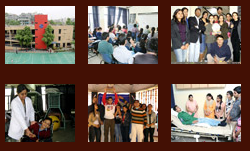Sexual Harassment
Administration
Internal complaint committee for Prevention of Sexual Harassment for Amar Jyoti Institute of Physiotherapy has been constituted and consists of the following members:
| 1. Dr Mansi Mittal (PT) | Assistant professor AJIPT,DU | Presiding Officer of the Committee |
| 2. Dr Tarun Kumar (PT) | Assistant Professor AJIPT,DU | Member |
| 3. Mr Rishi Katheria | Social Worker | Member |
| 4. Dr N Srivastav | Orthopedic Consultant Amar Jyoti Hospital | Member |
| 5. Mrs Renu Mohan | Lecturer Teacher’s Training Centre | Member |
| 6. Mrs Parinita Gaur | Clinical Psychologist. | Member |
| 7. Mrs Preety Jha | MPT 2nd Year AJIPT,DU | Student member |
| 8. Ms Megha Kumari | BPT 4th Year AJIPT,DU | Student member |
| 9. Mr Apoorv Tiwari | BPT 2nd Year AJIPT,DU | Student member |
For any complaints or assistance contact via mail address Info@ajipt.org
POLICY ON SEXUAL HARASSMENT
THE SEXUAL HARASSMENT OF WOMEN AT WORKPLACE (PREVENTION, PROHIBITATION AND REDRESSAL) ACT, 2013 (No.14 of 2013)[22nd April, 2013]
PART ONE
1.1 PREAMBLE
An act to provide protection against sexual harassment of women at work place and for the prevention and redressal of complaints of sexual harassment and for matters connected therewith or incidental thereto.
Whereas sexual harassment results in violations of the fundamental rights of a woman to equality under articles 14 and 15 of the Constitution of India and her right to life and to live with dignity under article 21 of the Constitution and right to practice any profession or to carry or any occupation, trade or business which includes a right to safe environment free from sexual harassment;
And whereas the protection against sexual harassment and the right to work with dignity are universally recognised human rights by international conventions and instruments such as Convention on the Elimination of all Forms of Discrimination against Women, which has been ratified on 25th June, 1993 by the Government of India;
And whereas it is expedient to make provisions for giving effect to the said Convention for protection of women against sexual harassment at work place.
1.2 SOCIAL CONTEXT OF SEXUAL HARASSMENT
Though violent conduct is prohibited both by law and by University Rules, a specific policy defining sexual harassment is required to address the specific form and extent of sexual harassment in the University. The policy recognises that sexual harassment is not an offence merely amounting to disruption of law and order. Sexual harassment is an act of power, and a public and collective violation that is often trivialised by labelling it an interpersonal transgression. It is therefore a violation of gender equality and also, of the right to a safe education and work environment for all. Sexual harassment not only affects a few individuals but reinforces gender-based discrimination for everyone.
It, therefore, becomes imperative that various educational institutions, and civil society as a whole, should take adequate measures to ensure the safety, security, dignity, rights and equality of women as much as of men. Such measures will strengthen social and professional relationships in the work place.
1.3 GUIDING PRINCIPLES FOR DEFINITION OF SEXUAL HARASSMENT AND REDRESSAL MECHANISM1.4 OBJECTIVES
To fulfil the directive of the Supreme Court enjoining all employers to develop and implement a policy against sexual harassment at the work place.
To evolve a permanent mechanism for the prevention and redressal of sexual harassment cases and other acts of gender based violence at the University of Delhi.
To ensure the implementation of the policy in letter and spirit through proper reporting of the complaints and their follow-up procedures.
To uphold the commitment of the University of Delhi to provide an environment free of gender-based discrimination.
To create a secure physical and social environment which will deter acts of sexual harassment
To promote a social and psychological environment which will raise awareness about sexual harassment in its various forms.
To generate public opinion against sexual harassment and all forms of gender-based violence.
PART TWO
DEFINITIONS
The sexual harassment of women at workplace (prevention, prohibition and redressal) Act, 2013 (14 of 2013) has come into effect. This Act supersedes the University Ordinance XV-D.
According to this Act Sexual Harassment, Aggrieved Woman and Workplace are defined as follows.
Sexual harassment: – It includes any one or more of the following unwelcome acts or behaviours (whether directly or by implication) namely:-
i. Physical contact and advances; or
ii. A demand or request for sexual favours; or
iii. Making sexually coloured remarks; or
iv. Showing pornography; or
v. Any other unwelcome physical, verbal or non- verbal conduct of a sexual nature;
The following circumstances among other circumstances if it occurs or is present in relation to or connected with any act or behaviour of above mentioned acts may amount to sexual harassment.
i. Implied or explicit promise of preferential treatment in her employment; or
ii. Implied or explicit threat of detrimental in her employment; or
iii. Implied or explicit threat about her present or future employment status; or
iv. Interference with her work or creating an intimidating or offensive or hostile work environment for her ;or
v. Humiliating treatment likely to affect her health or safety.
Aggrieved Woman:-
i. In relation to a workplace, woman, of any age whether employed or not, who alleges to have been subjected to any act of sexual harassment.
ii. Employee – means a person employed at a workplace for any work on regular, temporary, adhoc or daily wage basis, either directly or through an agent, including a contractor, with or, without the knowledge of the principal employer, whether for remuneration or not, or working on a voluntary basis or otherwise whether the terms of employment are express or implied and includes a co- worker, a contract worker, probationer, trainee, or called any other such name.
iii. In relation to dwelling place or house, a woman of any age who is employed in such a place.
Workplace: – It includes
i. Any department, organisation, undertaking , establishment, enterprise, institution, office, branch or unit which is established, owned, controlled or wholly or substantially financed by funds provided directly or indirectly by the appropriate Government of the local authority or a Government company or a corporation or a co operative society.
ii. Any private sector organization, institute, society, trust, non-governmental organization, unit or service provider carrying on contractual, professional, vocational, educational health services, etc.
iii. Sports institute, complex, stadium
iv. Hospitals and Nursing home
v. Any place visited by employee arising out of or during the course of employment including transportation provided by employer.
vi. A dwelling place or a house.



